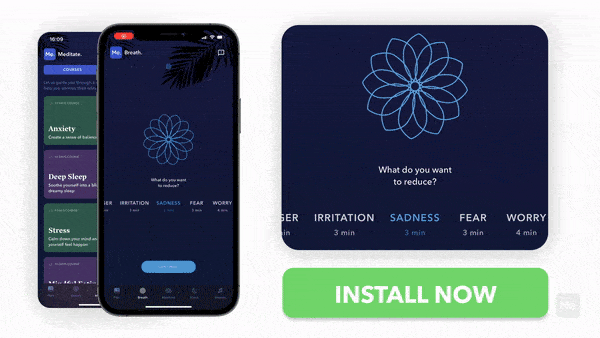Calming Meditation
The world is becoming a global market, with the possibility of meeting several persons increasing each and every day. Technological advancements have been making this quite easy. With this comes varying degrees of issues. Human beings need to relate with one another on a daily basis. Personality, values, and expectations differ between each of us, which is why there is a tendency for many people to go through a lot of stress, depression, and additionally other psychological and emotional challenges based on their daily experiences and expectations. To deal with this several solutions are available, one of which is calming meditation (10, 12).
Calming meditation helps one to achieve the boost of inner peace and calmness, and a good part of this is that a person does not necessarily have to pay for it. It is an inexpensive and easy-to-access activity. An individual could meditate anywhere they like and at any time, after they have made a habit of it. The practice of meditation has been around for a long time. At first, it was only done as a way of comprehending the mystery and sacredness attributed to the origin of life, and everything therein. Over time the practice of calming meditation has evolved into uses beyond just for the understanding of the spiritual. These days people practice it as a form of relaxation to reduce stress.
What Is Meditation?
Meditation is the intentional self-regulation of attention from moment to moment. Because it is intentional and self-regulated, its focus is hinged on relaxing and calming the mind and body. When meditating, a technique like mindfulness is used so that the mind will not derail unnecessarily into irrelevant subjects. During meditation there is usually something to focus the mind on. It could be a thought, specific object, or activity with the aim of creating attention and awareness so that the mind can be clear and the emotions calmer.
The practice of meditation is not a new age practice; it has existed over a long period of time. According to research, the practice comes from Asian cultures, and historically, it is known as a core component in many spiritual practices like Buddhism (6). Interestingly, since the 1960s, more attention has been given to it and more research has been conducted to better understand the benefits of the practice. Different physical and psychological health changes have been attributed to meditation, including reductions in metabolic activity, oxygen consumption, heart and respiratory rates, decreased depression and anxiety symptoms, and blood pressure.
Read More: Spiritual Meditation-How To Properly Cultivate This Craft For Spiritual Awakening
About Calming Meditation
Calming meditation isn’t just isolated within a person. It helps one to relate reasonably with people and situations. Meditation helps a lot with stress reduction that may arise from common situations in which people may find themselves (13). It is not news to anyone that stress can cause different sorts of body changes that may be oblivious to a person. Visible aspects of stress such as anger, anxiety, trauma, and pressure are the effects one can see which may be passed on to other people around the person undergoing it (10). Unfortunately, such manifestations will likely affect one’s social life. When deciding upon a form of meditation might be best, it would be wise to look at some of the different types of calming meditation for anxiety.
Forms Of Meditation
An important fact worth bearing in mind is that people go about meditation in different ways. Some people prefer to meditate in total silence while some other people prefer to have a little bit of sound in the background. There are two basic forms of meditation, namely guided meditation and unguided meditation (1).
Guided Meditation
Guided meditation refers to a type organized and directed by a teacher, who is an expert in the area of meditation. This form of meditation is mostly beneficial to people who are just learning the process and trying out meditation for whatever purpose. This is essential, especially because the practice of meditation is majorly dealing with the mind, which is full of varying degrees of complexities from one person to another.
In a guided meditation session, a person will learn how to understand what the mind contains and how to read those contents. After this, they are taught how to be calm during meditation and the techniques to use in transferring this calm into various aspects of an individual’s daily activities and experiences. Basically, a person is taught how to approach meditation and what procedures are involved before finally being led through the integration of this practice in everyday life (3).
Unguided Meditation
This form of meditation involves only an individual alone. The person basically decides how they want to go about their medication process. This will include the time to spend on meditation and where to practice it. What is often advised is that all meditation is done with a certain degree of serenity to prevent interruptions. An individual may decide to meditate while sitting on the floor or in a chair. They can also consider the position to lie down.
The important thing is to choose a position that one is very comfortable with, which means there is no hard and fast rule on the best position to take. Once one has found comfort it becomes impossible for the mind to drift towards the pain caused by sitting in an awkward position. This is also important as the individual will often need to be aware of their breathing.
Those who engage in an unguided meditation are usually people who have a certain degree of experience in the process. But then it is worth noting that the fact that a person’s meditation is unguided does not mean that they can’t apply specific techniques learned from others. Apart from that, it is best that only after meditation has become a habit for an individual that they practice this form of meditation.
If you’ve dipped your toes in meditation before but couldn’t sit through a session because of all the thoughts buzzing in your head, impulses snatching away control or all the overwhelming feelings that start bubbling up the minute you sink into the silence, it’s only because you didn’t have the right guidance. Start using BetterMe: Meditation & Sleep app and watch your life transform!
Types Of Meditation
Meditation helps an individual both emotionally and physically. It is even understood that consistent meditation is capable of changing the structure of the brain. Effective meditation can help a person deal with anxiety, depression, pain, and lack of sleep. It is also known to increase a person’s ability to focus. After understanding the various forms of meditation that a person can engage in, it is also worth finding out about the different types of meditation that one can be engaged in (3).
1. Mindfulness Meditation
This type of meditation is based on some teachings of Buddha, and it is one of the most popular forms of meditation. When engaging in it, what an individual does is simply pay attention to their thoughts as they flow into their minds without judging or attempting to comment on them. The person serves as a mere observer and notes the pattern in which they appear. This type of meditation can be classified under unguided meditation.
2. Spiritual Meditation
This type is used in religions like Christianity, Hinduism, and Daoism. It is a silent form of reflection and creating a connection between oneself, one’s God or whatever supreme being that an individual holds in high esteem, and the universe. During this meditative moment, certain oils are used to increase the experience of spirituality. Frankincense, Sage, Cedar, and Myrrh are some of the oils used for this purpose. It is a beneficial form of meditation for people who love quiet times and seek to grow spiritually.
3. Transcendental Meditation
This is another popular type of meditation. It is a form of meditation that is suitable for people who love systems’ structure and organization. People who practice this type of meditation are usually serious about consistently practicing their meditation. Transcendental meditation is also a form of spiritual meditation. In this practice, an individual sits in a fixed position and breathes slowly. As the name suggests, the aim is to take a person beyond their present state of being. In this form of meditation, what they do is concentrate on certain types of mantra or choose suitable words to repeat.
4. Zen Meditation
This is also referred to as zazen. It can be part of a Buddhists practice. This type of meditation takes the guided format as it involves certain types of procedures and steps. The purpose of engaging in this meditation process is very similar to that of mindfulness meditation. The only thing is that a higher degree of discipline is required. People who have a desire to grow spiritually practice this form of meditation. All that is needed is to find a comfortable position and concentrate on one’s breathing activity. An individual practicing this will observe their thoughts and patterns without attempting to pass judgment on them.
5. Loving-Kindness Meditation
As the name implies, this type of meditation is used to spread love among those who practice it and other people around them. Benevolent and loving energy toward oneself and others are part of the focus during the practice. As an individual meditates, they may write down certain positive and loving words and then read them aloud to themselves. Then, they say the same positive and kind words to people they care about like they are there with them. This form of meditation also makes excellent use of visualization.
Meditation And Anxiety Treatment
Anxiety is part of human experiences, and it is not necessarily a bad thing unless a person consistently lets it get the better of them. People get anxious, especially when they don’t know what the outcome of certain situations could be. Students get anxious and nervous before the commencement of an examination; a worker may become anxious about an imminent promotion. A job seeker may be nervous about an interview. A public speaker may be anxious before stepping onto the podium to speak to a crowd of people. Some athletes are also known to be nervous before starting a competition that they have been practicing for, for a long time.
Basically, every human experiences anxiety and this is not a problem; when a person does not know how to manage it, then it becomes one. This is where meditation can be of great help. When an individual begins to feel like anxiety is getting the better of them in their daily activities, then it may be time for them to seek measures toward correcting it. Various research studies which have been conducted have established the fact that anxiety disorder is a serious form of mental illness that may lead to other damaging effects if not taken care of immediately (4, 5, 15). This psychological illness is beyond occasional nervousness or fear. People who suffer from anxiety are most likely going to experience prolonged anxiousness, which may also negatively affect different aspects of their lives, including their relationships with others.
Various Forms Of Anxiety Disorder
There are various forms of anxiety disorder. Generalized anxiety disorder is a type of anxiety that occurs to a person when they think a lot about certain aspects of their life. This anxiety may have a ripple effect in their private and social life. Some of the symptoms of this type of anxiety include restlessness, fatigue, loss of focus, blank mind invitation, and sleeplessness.
Besides this, panic disorder is a type of anxiety experienced by people who suffer from frequent panic attacks. During panic attacks, the individual experiences a kind of fear which may seem real even if the situation is only imagined. During this period, the person may experience increased heartbeat rate, sweat, tremble, and shortness of breath. Because this experience is not usually a nice one, the individual may be faced with worries about avoiding a panic attack.
Separation anxiety disorder is another form of fear generated from worrying about being left by people they are attached to. Those undergoing this may begin to imagine scenarios where the person they are attached to becomes hurt when they are separated from them.
It is usually suggested that anxiety disorder may be genetic or related to some environmental elements. People may also develop anxiety disorder based on their previous experiences in early childhood or adulthood. When individuals observe that they are experiencing anxiety and cannot control it, it may be time for them to visit a certified health practitioner for necessary actions.
Can Meditation Help To Get Rid Of Anxiety?
Can meditation get rid of anxiety? From research study results, meditation has a positive effect on generalized anxiety disorder. Considering a 2013 research study conducted on the effect of meditation on anxiety and stress reactivity using 93 individuals with DSM-IV diagnosed GAD found out that Mindfulness-Based Stress Reduction (MBSR) program can have a beneficial effect on anxiety symptoms in GAD. Also this program is capable of improving stress reactivity and coping, based on what was measured in a laboratory stress challenge (11). Another research study was conducted on mindfulness meditation as a self-help treatment for anxiety and depression and the results also supported the assertions of the previous study (6).
Running a never-ending rat race, shoving trauma further and further away, falling into self-harming thought patterns, living life that’s eclipsed by constant anxiety and fear – this is what an average person goes through every day. Nor addressing it will only pull you deeper into a downward spiral. BetterMe: Meditation & Sleep app will help you gain a new perspective on life and help you regain that long-lost internal balance!
Music And Anxiety
One of the methods usually prescribed to relax the mind during bouts of anxiety is listening to music. It is sometimes called the food for the soul. Listening to certain types of music might help individuals overcome some feelings of anxiety when they happen to experience them. Research conducted at Stanford University on how music affects the mind and helps one to relieve stress showed that playing some kind of music improves the body’s coping mechanism for stress (8). Fast music makes a person more alert. Upbeat music makes an individual positive about events happening around their lives, while music with low and slow tempo helps to relax the mind and keeps it calm.
From this research it was found that music containing about 60 beats in a minute makes the brain work faster (16). Since music is easy to access, scientists have recommended it as a tool for reducing anxiety. Music that will help in mindful activity and calming meditation does not necessarily have to be laden with words. Sometimes, only instrumental music can do the job.
Relaxing Music And Sounds
Research conducted on the therapeutic effect of rhythmic music found out that listening to the sound of thunder, rainfall, rushing water, beach waves, and other sources of sounds in nature can help to relax the mind against anxiety (17). But it is worth noting that which type of music will help to bring calmness to one’s mind may vary from person to person, depending on the type of music that they love to listen to.
So, how does meditation with calming music help relieve anxiety? Since meditation is aimed at relaxing the mind in order to be able to perform optimally at other aspects of one’s life, it may be useful to look at how meditation, accompanied by calming music can help one deal with anxiety. The effect of music in the everyday life of human beings cannot be overemphasized. Music is an agelong activity enjoyed across various cultures and parts of the world. Some psychologists use it during meditation to investigate and address or treat sleep problems in their clients.
Calming Meditation Techniques
The techniques involved in meditation will depend on the type of meditation that an individual is practicing. There are different types of meditation, and they help to target various mind related issues of concern. For a person wants to meditate, some of the procedures explained below may help (15):
Body Scan
This technique helps an individual focus on certain parts of their body to recognize and relieve stress that they may be feeling in that area. Another exciting thing about the technique is that it can improve a person’s mental connection with the body.
Guided Imagery
In this technique, a person imagines scenarios, places, situations, and other general things that make them happy and helps to relax their body and mind. It is noteworthy to consider that the imaginations should be relevant to a person’s personality in order to relate with them better. When this is practiced, it can help to strengthen the positivity and optimism about oneself. However, this can be a difficult technique to observe if an individual is a type that finds it hard to maintain focus and imagine things.
Mindfulness Meditation
In this technique, what a person does is sit comfortably and focus their mind on the present without thinking about the future and the past. When practicing this meditation technique for the purpose of achieving a calm state, it might be helpful to follow this procedure:
- Maintain a comfortable position but not too comfortable so that the temptation to sleep off does not overwhelm you. Bear in mind that it does not have to be a sitting or standing position. Likewise, the position should not be totally uncomfortable so that the mind does not drift from the meditative state into something else.
- Your total concentration should be on your breath. Let it be slow, long, and then deep inhalations and exhalations. As you engage in this, gradually detach your mind from whatever thoughts and sensations that may want to distract you.
Sleep Meditation Exercise
A common form of meditative exercise to induce quality sleep is visualization. This is a great meditative technique as it helps the body remain calm and relaxed, promoting good sleep. Imagining various events and scenarios basically means to be involved in daydreaming and visualizing. When a person visualizes, their imagination creates a place for the mind to be calm, and then their body can take a rest. Visualization is said to help the body in relaxing the mind, thereby leading to total calmness. It is like taking the mind on a road trip that one won’t have to pay for (2).
How To Do It
- Close your eyes and imagine a place you love to be in because of the serenity it offers. It could be anywhere in the world.
- Try as much as possible to see and feel everything you are imagining. This will require the engagement of your sense organs as they must also engage in the imagination process with you; with them, you may feel the beauty.
- Then, as you do this make sure you don’t allow your distracting thoughts to linger.
Calming Sleep Meditation
When a person suffers from anxiety and stress, it will affect the quantity and quality of sleep that they get. Some people find it hard to sleep, which is why they resort to using sleeping medication. Unfortunately, most adults who find themselves in this situation find it hard to have the much-needed sleep that will keep their bodies active and healthy.
The inability and lack of proper sleep can have terrible effects on the body system. It causes headaches, fatigue, lack of concentration, decreased alertness, and lack of motivation, among others. A person who suffers from insomnia stands the risk of increased blood pressure, stroke, and weakness of the immune system (2, 9, 14). It may also lead to serious mental disorders and the probability of depression and anxiousness. Basically, a person who suffers from chronic insomnia may find it hard to function properly in their daily activities.
Why Do People Find It Hard To Sleep?
People find it hard to sleep for different reasons. It may be biological, environmental, or as a result of choices and type of lifestyle. Naturally, everyone tends to become aware of everything that happened during the day when they are about to sleep at night. Anyone who falls prey to this and allows their mind to rerun the show may never really find quality sleep because their mind could remain active for a long time. From research studies conducted on the impact of technology on sleep and health, it was found out that technology is also a cause of sleeplessness because consistent use of phones and laptops has been attributed to lack of sleep in many people (18).
A person who resides in an environment that is usually busy or noisy may find it challenging to have a night of sweet sleep. This is why meditation for inducing sleep is an excellent option as it helps to focus the mind on the sleep one is about to catch and shut it against other extraneous factors. Research into how meditation affects sleep was carried out on some 49 adults who had varying degrees of sleeping problems. The people used in this study were given about six weeks of meditation. After this duration, it was observed that their sleeplessness was reduced and this in turn made them more active during the day (14).
The Effects Of Sleeplessness Are Rippling
The effects of sleeplessness are rippling and will likely affect some other aspects of a person’s life. Such persons suffer from memory loss, reduced sexual drive, cloudy judgment, and decision-making process. If it continues for a long time, it can reduce life expectancy. Therefore, it is necessary for a person in this condition first to understand why they are experiencing a lack of sleep and how to go about providing solutions for it. To enjoy deep relaxation and a night of good sleep, meditation calming the mind processes will come a long way. Nevertheless, the rate and ease of falling asleep vary from person to person. Some people will not sleep until their mind and brain sleep, which may take a long while, depending on situations and happiness in their lives. It is, therefore, necessary for individuals to find suitable calming sleep techniques that suit them.
Calming Meditation
Since the reason why an individual is not falling asleep may be related to the mind worrying and stress, meditation can help increase the state of relaxation since it also works on the mind. Anyone in this situation may want to involve or engage in mindfulness meditation or guided meditation for quality sleep. However, before starting, all forms of distractions must be removed from your room. Anything that can deprive of an effective focus should be done away with. These may include switching off the phone, television set, lights, and laptop. After this, the next steps should help:
- Lay down comfortably;
- Focus on your respiration;
- Do not let your mind wander away, thereby bringing back memories which may hinder the activity at hand;
- Just breathe and observe how your body feels.
Conclusion
In conclusion, meditation is an activity that has several physical and psychological benefits for everyone who practices it. Irrespective of the purpose an individual is engaged in, calming meditation can be achieved, especially when a person is undergoing stress, depression, and other health challenges that relate to the mind. Anyone who finds it difficult sleeping soundly or cannot focus on a thing at a time can find this activity beneficial.
DISCLAIMER:
This article is intended for general informational purposes only and does not address individual circumstances. It is not a substitute for professional advice or help and should not be relied on to make decisions of any kind. Any action you take upon the information presented in this article is strictly at your own risk and responsibility!
SOURCES:
- 7 Calming Meditation Techniques for Beginners (2020, allure.com)
- 20 Best Guided Meditations for Sleep and Insomnia (2020, lifehack.org)
- 30 Meditation Exercises and Activities to Practice Today (2019, Positivepsychology.com)
- Anxiety disorder (n.d., nimh.nih.gov)
- Anxiety disorder (2020, psychcentral.com)
- An update on mindfulness meditation as a self-help treatment for anxiety and depression (2012, ncbi.nlm.nih.gov)
- A Randomized Controlled Trial of Mindfulness-Based Stress Reduction for Women With Early-Stage Breast Cancer Receiving Radiotherapy (2013, pubmed.ncbi.nlm.nih.gov)
- Feeling the beat: Symposium explores the therapeutic effects of rhythmic music (2006, stanford.edu)
- How Meditation Can Treat Insomnia (n.d., sleepfoundation.org)
- Meditation: a simple fast way to reduce stress (2020, mayoclinic.org)
- Meditation for Generalized Anxiety Disorder: Effects on Anxiety and Stress Reactivity (2013, psychiatrist.com)
- Meditation Inhibits Aggressive Responses to Provocations (2018, mijl.bsl.nl)
- Mindfulness and Compassion: An Examination of Mechanism and Scalability (journals.plos.org)
- Mindfulness meditation and improvement in sleep quality (2015, jamanetwork.com)
- Mindfulness Meditation Can Help Relieve Anxiety And Depression (2020, npr.org)
- Relaxing Music for Anxiety Control (2011, academia.oup.com)
- Releasing stress through the power of music (n.d., unr.edu)
- The Use of Technology at Night: Impact on Sleep and Health (2013, jcsm.aasm.org)



























